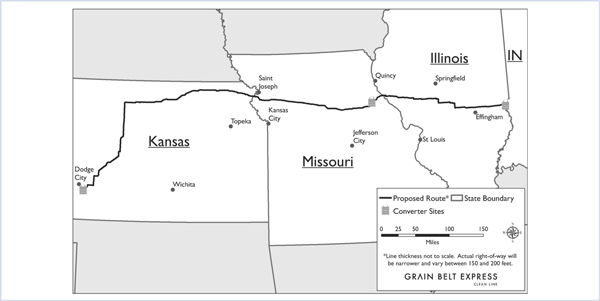By Tom Kleckner
Clean Line Energy Partners said Thursday it is considering legal appeals and other options following the Missouri Public Service Commission’s third rejection of its proposed Grain Belt Express.
The PSC on Wednesday rejected Clean Line’s request for a certificate of convenience and necessity (EA-2016-0358). The commission previously denied the $2.3 billion project last year on a procedural error, and in 2015 for not proving the project’s necessity and worth.
Mike Skelly, Clean Line’s founder and president, said the company will review the PSC’s order to determine its next course of action.
“We are currently assessing all existing authorities available to move the Grain Belt Express project forward, including, but not limited, to legal appeals,” Skelly said in a statement. “The PSC’s decision … sends a clear message that investors contemplating new infrastructure projects should not come to Missouri.”
Clean Line’s other options, said spokesperson Sarah Bray, include asking the PSC for a rehearing, working with the state’s legislature to revise pertinent laws or seeking U.S. Energy Department approval under Section 1222 of the 2005 Energy Policy Act. The latter would authorize the department to take part in “designing, developing, constructing, operating, maintaining or owning” new transmission.
“The project is certainly not dead,” Bray said.
Following the PSC’s 2015 rejection of the Grain Belt Express — when the commission determined there weren’t enough benefits for Missouri consumers and cited landowner opposition — Clean Line signed up more than three dozen cities to purchase about 100 MW of power from the project. The Houston-based company projects ratepayers in those cities will see annual savings of $10 million.
Four of the commission’s five members said in a concurring opinion Wednesday the project is needed, economically feasible and beneficial to the public.
However, they referenced a March state appeals court ruling on an unrelated case involving Ameren Transmission Company of Illinois, which found that infrastructure projects must first secure approvals from each county it crosses.
In 2012, Clean Line won permission from the commissions of eight counties to construct the line along and across their public roads. But the company was tripped up in Caldwell County, after a court ruled in 2015 that county officials had violated the state Sunshine Law when they approved the line.
“It was in the public interest to approve the line,” PSC Chairman Daniel Hall said. “Unfortunately, because of the structure of this commission and because of the legal system in this state, we were unable to act in the public interest.”
Commissioner Steve Stoll did not sign the order, saying “the court has spoken.”
Bray told RTO Insider that Clean Line was “encouraged by the PSC’s determination that the project is in the public interest and will benefit the State of Missouri.”
The “ruling is inconsistent with good government and sound public policy, and it is our hope that moving forward, Missouri will work to remove barriers to building new critical infrastructure projects,” Skelly said.
James Owen, executive director of Renew Missouri, which supports renewable energy and energy efficiency, said the PSC ruling is based on a misreading of state law and undermines Gov. Eric Greitens’ promise to eliminate “job-killing regulations.”
“The [appellate] opinion now says that a few county commissioners have absolute veto power over the regulatory decisions of the federal and state government,” Owen said in a statement. “This multibillion-dollar project spanning four states is now stalled due to a baseless objection from a single Missouri county. … In the face of this absurd result, Gov. Greitens’ silence is deafening.”
The Grain Belt Express would deliver approximately 4,000 MW of wind power from western Kansas through Missouri and Illinois to the Indiana border over 780 miles of DC lines. Kansas and Illinois regulators approved the project within their states in 2013 and 2015, respectively.
Clean Line said the decision would be “devastating” for Missouri ratepayers and workers “who will be deprived of good paying local jobs.”
The company had support from a number of the state’s companies and organizations, including the Missouri Joint Municipal Electric Utility Commission, the Missouri Department of Economic Development, the International Brotherhood of Electrical Workers, the Missouri AFL-CIO, The Wind Coalition and Wind on the Wires.






